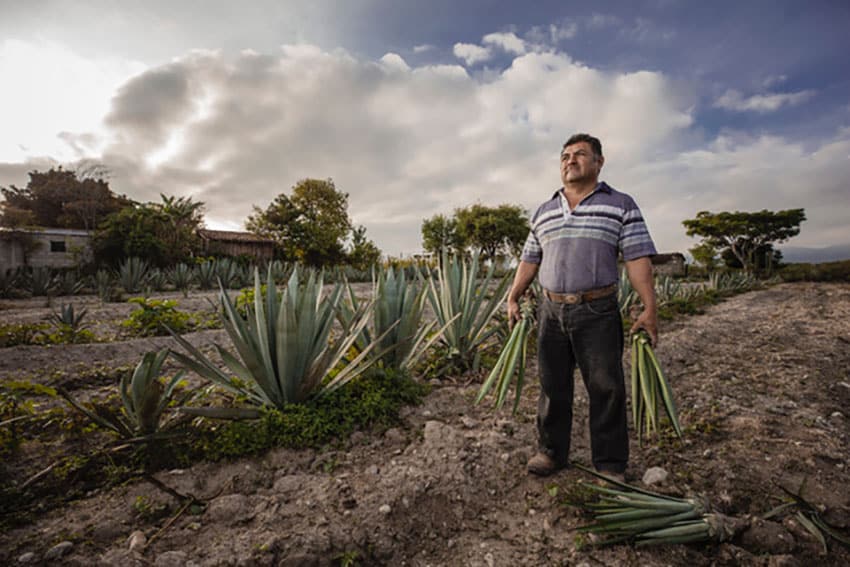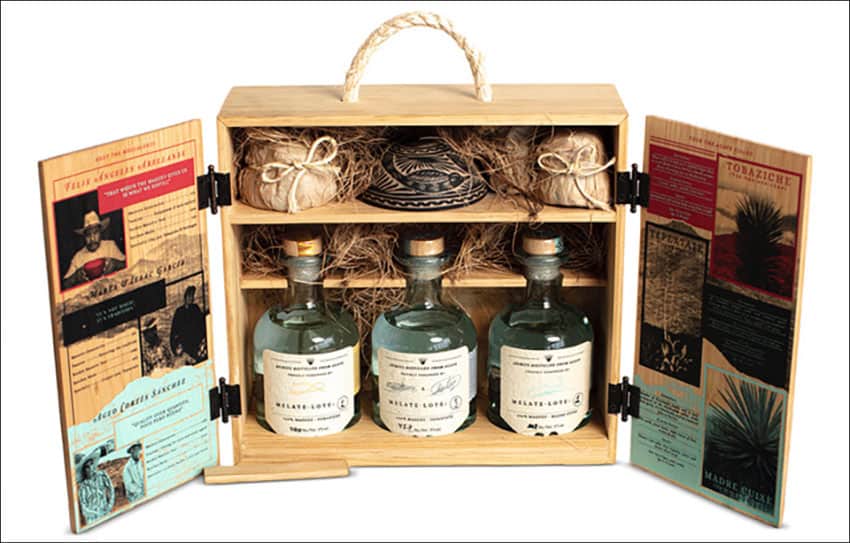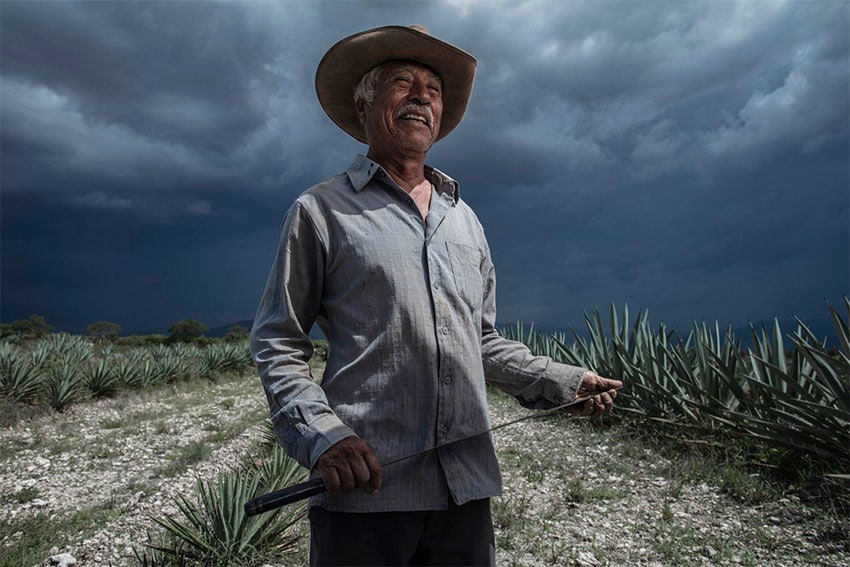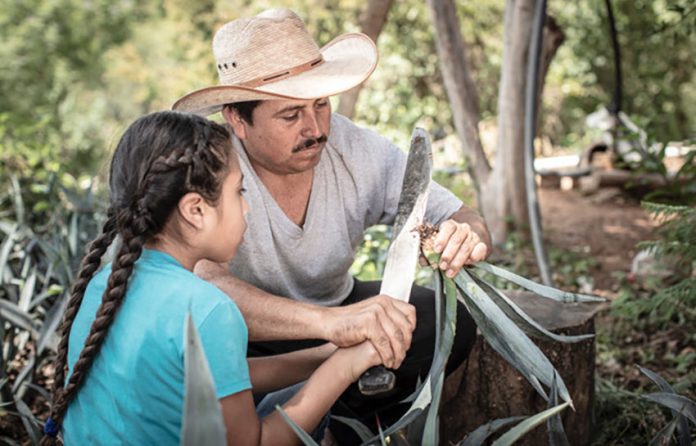It wasn’t until Dalton Kreiss stepped onto Antonio Carlos Martínez’s maguey fields that he finally felt he understood something about mezcal.
“I went out to the agave field and saw these 10-foot plants sort of casting a shadow on me, and Antonio shows us the process, of this amazing artisanal mezcal, and he puts his hand into the fermentation batch and says ‘this one has . . . probably one more day.’
“I come from an industrial engineering background with all these sensors and precision, and when he just stuck his hand into that fermentation vat I was in awe that something so artisanal still existed in the world.”
Kreiss spent the first few years of his post-college life building massive automation machines for the aerospace industry, about the furthest thing from artisanal mezcal that you can get.
He had tried the drink a few years earlier when his partner Hanna Woodside, already living in Oaxaca, brought some to Germany where Kreiss was finishing his MBA. He didn’t dislike it, but he wasn’t overly passionate about it either.

When he finally found himself in the Oaxacan fields, meeting the family producers of what has become one of Mexico’s most trending exports, he was hooked – on the product, on the process, on the people.
Kreiss moved to Oaxaca and he and Woodside began visiting small palenques – mezcal production farms – slowly developing ties with local producers around Oaxaca city.
Kreiss had been dreaming of starting his own small business and realized that he wanted to show the world this “elixir of the gods” in his own unique way.
Cognizant that he was a foreigner about to get involved in a deeply local industry, he worked to craft a business model that would spotlight the makers themselves, their backgrounds and their philosophies about mezcal making.
One of the ways he would to do this was by creating individual web pages for each of the producers complete with interviews, photos, contact information and production information easily accessed by anyone.
“A quick lesson in Mexican history reveals a country drenched in foreign and internal exploitation from the age of the Spanish empire, to the era of Porfirio Díaz, and that continues today . . .” Kreiss wrote recently in an article for the website Mezcalistas.

“Our business model, which pays the mezcaleros fairly and does not bind them to contracts, distributes the commerce to many and helps get their name out there to the world (in fact their name is front and center on the label, while our brand is more of a footnote). But we want to take it a step further to help these mezcaleros solidify their independence for generations to come.”
“As I see it,” he adds, “we have consciously designed a business model around the concept of how a responsible foreign entity should operate in a globalized capitalistic society. We do not buy land and hire farmers, we do not own the mezcaleros and their palenques, we source all of our materials that go into this physical product locally, and we even go way out of our way to hire local services and nationals in terms of video editing, photography, design, digital marketing, etc.
“Furthermore, we are not some distant owners who live in the U.S. and spend our living expenses and profit there. We live in Oaxaca, assimilate into the community and pull money from the U.S. economy and flush it into the Mexican economy. From a macro and micro economics viewpoint, that’s responsible globalization.”
After surviving a series of bureaucratic headaches on both sides of the border, Maguey Melate was born and Woodside and Kreiss began to export mezcal to the United States in the form of a monthly mezcal club. True to their original mission of highlighting mezcal producers, this club is much more than the box that arrives at your doorstep each month.
They give subscribers greater context for where this delicious product comes from by providing in-depth interviews with producers, photos and lots of additional information in the form of the monthly mezcalero page, as well as platforms that allow subscribers to interact with one another, leave tasting notes and collect all that information into a booklet that they receive at the end of the year.
Mezcal can be a tricky beverage when you find something that you like. No two years or batches are ever the same, even if they come from the same fields and are made by the same hands. Batch size is generally small. For subscribers that find something they love they have the option of purchasing another bottle from the same batch if available, or if not, at the very least getting another bottle from the same producer in the following round of production.

The sheer complexity of the import-export process on both sides of the border as well as the language barrier keeps a lot of small producers from distributing abroad (Mexico exported about 3.42 million liters of mezcal in 2018 compared to over 211 million liters of tequila). As producers started to ask for additional help in moving their product, Maguey Melate decided to begin distributing to bars and restaurants in the United States through direct sales and online at their digital store.
Kreiss also wants to encourage true connoisseurs to make the leap and come down to Oaxaca to see the maguey fields for themselves. Each mezcalero web page includes a map with GPS coordinates and information on how to contact mezcal makers directly for an on-site visit. For folks that want a liaison (or who don’t speak Spanish) Maguey Melate offers guides to take them out to the farms to meet the producers.
For mezcal lovers that want to dig deep but feel hopelessly far from Mexico, this new monthly club is a way to taste unique, small-batch mezcal, and gain a deeper understanding about the people making it. For Kreiss, it’s a way to share his newfound passion for mezcal with the world.
Lydia Carey is a freelance writer based in Mexico City and a frequent contributor to Mexico News Daily.
